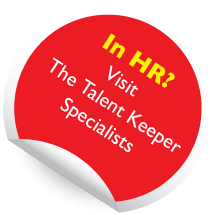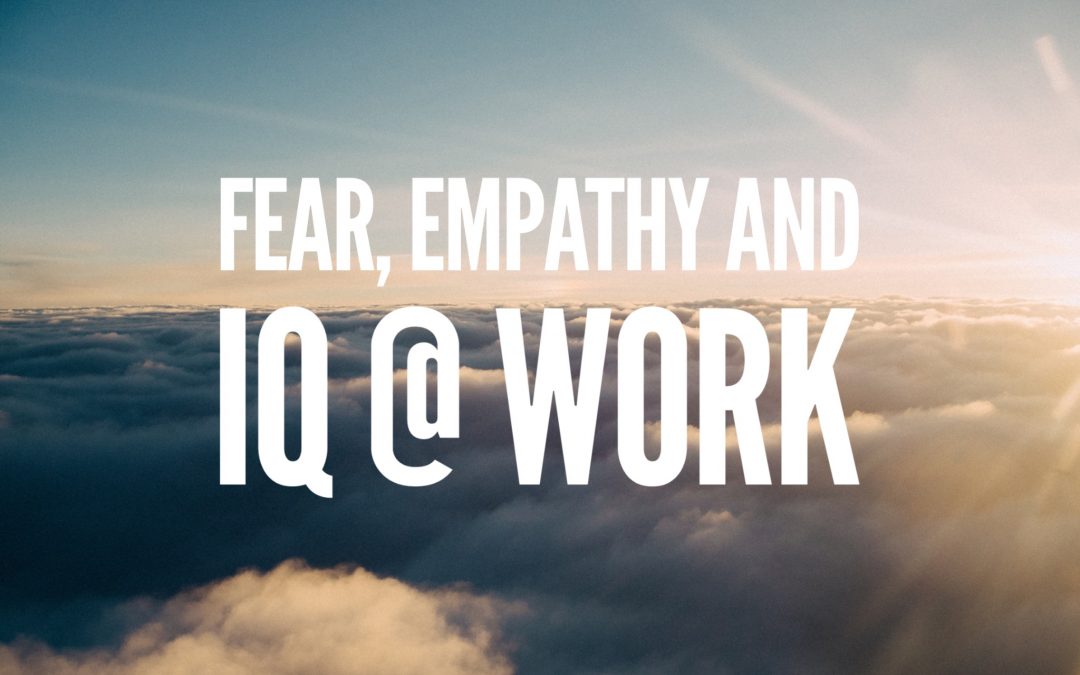Fear, empathy and IQ @ work
High in the trees on an azure blue day a lady I later discovered to be part of Mary Portas’ team, yelled “you can do it, you’re a strong woman, just keep looking forwards.” It was me she was calling to in response to my shouting down to husband: “I can’t do it, I can’t move. I’m petrified.” This, my dear bright minds, was my first encounter with Go Ape. In this musing I’m talking about fear and other emotions in the workplace.
Whilst my children took to it like monkeys, moving non-stop as though sauntering happily back from the paper shop with bags of overpriced pick and mix (admittedly I’ve never seen a monkey do this), I was experiencing my first ‘fear freeze.’ I can’t recall this ever happening to me before and it was awful. My usual response to being afraid is to ‘fight’ or flee. But this time my feet just wouldn’t budge. That was until Mary’s woman’s words came at me from behind and my husband’s from below. They encouraged me to keep going and so I did eventually start to move. Slowly, cautiously, stiffly and with a lot of self-talk (mainly downward comparisons such as “would you rather be doing this or giving birth again?”) I did it. I even got a certificate and a sticker. Huzzah!
 As I neared the end and whooshed down the final zipwire (the least worst bit) I got to thinking about the amount of hidden fear in the workplace and what it’s doing to our health, our relationships with our colleagues, our productivity, our families and our reputations. I was only able to overcome the horror of Go Ape because I made it really clear what was going on inside my head and essentially (literally) yelled for help. But how many times have you or your colleagues experienced fear, sadness, anger or shame at work and nobody had a scooby-do? If you’ve never experienced, strong, impairing emotional states at work you’re probably in the minority.
As I neared the end and whooshed down the final zipwire (the least worst bit) I got to thinking about the amount of hidden fear in the workplace and what it’s doing to our health, our relationships with our colleagues, our productivity, our families and our reputations. I was only able to overcome the horror of Go Ape because I made it really clear what was going on inside my head and essentially (literally) yelled for help. But how many times have you or your colleagues experienced fear, sadness, anger or shame at work and nobody had a scooby-do? If you’ve never experienced, strong, impairing emotional states at work you’re probably in the minority.
The psychologist Alex Fradera put an interesting study under my nose recently via the British Psychological Society’s Research Digest, about intelligent people making less effective leaders. According to a paper published John Antonakis, Robert House and Dean Simonton at the University of Lausanne, when IQ exceeds 128 there is a clear, distinct and statistically significant reversal in leadership effectiveness. Up to that point we see an increase in leadership effectiveness with increases in IQ, as measured by something called the Multifactor Leadership Questionnaire. So could it be there’s more negative emotion swishing around teams with uber clever people at the helm because it’s not being picked up/drawn out and dealt with? Maybe I’m stretching the research but it’s an interesting thought isn’t it?
I should perhaps caution that although this was a robust study, of the sample of 379 leaders only 27% were female. I wonder if we’d have seen a difference if 50/50 or all women?
I’ve been working with a super smart female leader this year who’s keen to be promoted to partner. Our conversations have been around how she can shape other people’s perceptions of her and broaden her behavioural repertoire to have a better impact on junior colleagues. Through our coaching sessions she’s taken another look at how she thinks and the speed at which she moves through ideas. She’s seen for first time how she can have a tendency to overwhelm some of the more junior teams members, leave others behind and set impossibly high standards. All of which were having an undesirable impact. The excellent news is that change is afoot and good things are happening for her and the business.
Back to that fear. My ask this time is simply that you stop to wonder what’s really going on for that ‘difficult’ man; that ‘cold fish’; that ‘arrogant b**tard; that snotty ‘b***h’ wherever you encounter them. The root could be fear. Fear he’s going to be exposed; fear her team knows more than she and they have little respect for her; fear his drive has gone and doesn’t know if it’ll come back; fear her maternity cover is way better and way more liked than she is; fear he’ll screw up the client pitches he needs to win to keep the agency afloat.
So go on, scratch beneath the surface this month and see what you find – and whenever a colleague indicates they’re afraid please rush in because no one should ever be literally or metaphorically stranded up a tree when they’ve been brave enough to say it.
Until next time, celebrate your strengths and share your weakness.











